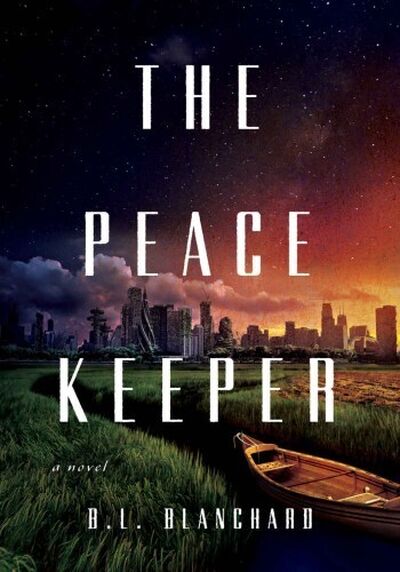Wanna Be Wicked
The Peacekeeper (Good Lands, volume 1)
By B. L. Blanchard

22 Nov, 2024
B. L. Blanchard’s 2022 The Peacekeeper is the first book in the Good Lands alternate-history police-procedural series.
Twenty years ago, the village of Baawitigong was rocked by a brutal crime. Ishkode immediately confessed to his wife Neebin’s murder. The Adjudicators and Mediators assigned to the case saw no alternative but the most extreme: consigning Ishkode to prison.
Ishkode and Neebin’s children Chibenashi and Ashwiyaa were functionally orphans. Then seventeen, Chibenashi did his best to provide younger sister Ashwiyaa with a parent figure. Despite his best efforts, and those of auntie1 Meoquanee, Ashwiyaa has spent the twenty years since Neebin’s death withdrawn and dependent on Chibenashi. Consequently, Chibenashi has had to set aside all ambitions to care for his sister.
On the twentieth anniversary of Neebin’s death, Meoquanee, Neebin’s best friend and Chibenashi’s auntie, is brutally murdered. This time nobody steps forward to shoulder the blame. This time, the peacekeepers will have to solve the mystery.
Chibenashi is a peacekeeper.
Baawitigong is a small village where determining the cause of transgressions is never very difficult. Therefore, certain best practices are not always followed. Investigating a murder when the victim is effectively family, when one is a witness to the last hours of the victim’s life, is a terrible idea. Nevertheless, Chibenashi assists in the investigation.
Some of the evidence points towards an unplanned crime of passion. Other evidence suggests that the killer had the presence of mind and necessary knowledge to hamper investigation by removing some personal items of the victim’s that might assist investigators. Meoquanee clearly knew her killer but, by luck or planning, nobody took note of the killer’s entry into the victim’s home.
Chibenashi discovers that he didn’t know Meoquanee as well as he thought. The logical people to consult are Meoquanee’s estranged ex-husband Takumwah and son Sakima. This will not be as straightforward as talking to witnesses in the village.
Father and son moved away to the big city of Shikaakwa years before. They’ve never returned to Baawitigong, not even for Meoquanee’s funeral. Phone calls produce nothing of value from the taciturn pair. Clearly, someone is going to have to go to Shikaakwa in person, to interview Takumwah and Sakima and send any vital evidence collected to the lab.
In the eyes of Chibenashi’s superior, that someone should logically be Chibenashi. Unable to decline the assignment, Chibenashi reluctantly leaves Ashwiyaa behind and journeys to Shikaakwa.
Revelations await! Most of them terrible beyond the peacekeeper’s ability to imagine.
~oOo~
The Peacekeeper is set south of the Great Lakes, in what we would call Illinois. It’s no coincidence that Shikaakwa is the word from which Chicago takes its name. In this world, for reasons that are never explained, Europe never established colonial empires. Consequently, the polity in which the story is set, Mino-Aki, the citizens are Anishinaabe, Odawaa, Neshnabé, Hocągara, Myaamia, Memoceqtaw, Maskoutench, Meshkwahkihaki, Othâkîwa, Giiwigaabaw, Shawanwaki, and Wyandot. Europeans, Africans, and Asian people are uncommon, exotic tourists.
The technological toolkit available in Mino-Aka is more or less the same as the one we currently have2. Readers may have many questions about how exactly Chibenashi’s world arrived at this state, as the specific events that led to our current technological prowess3 could not have happened. Blanchard is not at all interested in answering those questions.
Instead, the focus is on how a First Nations nation that developed in the absence of settlers might look, and how it would deal with serious social transgression. While there are some superficial similarities to American policing, the differences are significant. Peacekeepers don’t see themselves as embattled warriors surrounded by enemies; the justice system is focused on rehabilitation and victim compensation, rather than accumulating slaves for the prison-industrial system.
Which isn’t to say that Mino-Aka is utopian, however proud Takumwah is of the political-economic arrangements. Mino-Aka committed the same error found in so many other potential utopias: it involved humans. There may have been no European settler nations, but Mini-Aka is not the voluntary confederation the Anishinaabe like to think it is. The T’wah‑T’wah were annexed, renamed, and their culture reduced to amusing local quirks. Furthermore, the justice system does not always produce results that are pleasing or just.
The bit that caught my eye is that unlike the vast majority of procedurals I’ve read, various developments that would clearly be absolutely awful ideas in real life are in the novel calamitously bad decisions. Backwater Baawitigong does not have the necessary skill set to manage serious crimes; Chibenashi is too close to the case for his efforts to be anything but counterproductive; the courageous decision by a lone wolf cop to ignore mandatory investigatory guidelines turns out to be the incredibly stupid mistake it so obviously is. The consequences of these mistakes I am absolutely certain will be known in the sequel to this book (The Mother, 2023).
Although Blanchard clearly belongs to the John M. Ford school of background exposition, The Peacekeeper is an intriguing alternate world procedural, a crime and punishment narrative whose characters are deeply flawed but engaging. It was a fascinating introduction to Blanchard’s work, and I look forward to reading The Mother.
The Peacekeeper is available here (Amazon US), here (Amazon Canada), here (Amazon UK), here (Barnes & Noble), here (Chapters-Indigo), and here (Words Worth Books).
The Peacekeeper is also available here (Apple Books) but only as an audiobook.
1: The term auntie isn’t used in the book, but I needed a concise term for older woman, in this case a friend of the parents, who fills a mentoring role.
2: For that matter, economics professor Takumwah reveals that both capitalism and communism exist in this world. However, obviously nobody in the novel speaks English (which may not exist in the form we know). They speak Anishinaabemowin. Whatever words Takumwah used, they were not actually capitalism and communism.
3: Words that don’t appear in the text: atomic, nuclear, WMD.
